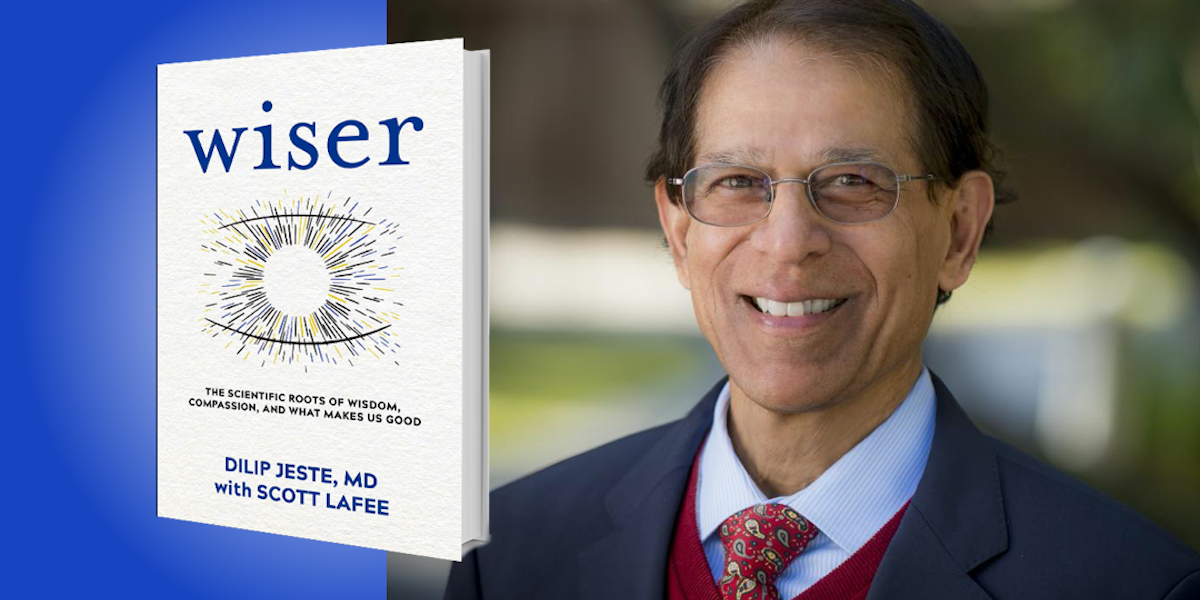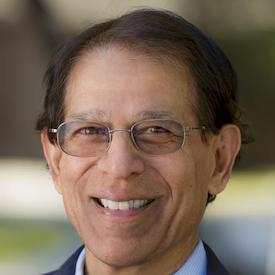Dilip Jeste, MD, is a professor of psychiatry and neuroscience at the University of California, San Diego, and director of that school’s Center for Healthy Aging. He is a neuropsychiatrist specializing in geriatric issues, and previously served as president of the American Psychiatric Association.
Below, Dilip shares 5 key insights from his new book, Wiser: The Scientific Roots of Wisdom, Compassion, and What Makes Us Good, written with Scott LaFee. Download the Next Big Idea App to enjoy more audio “Book Bites,” plus Ideas of the Day, ad-free podcast episodes, and more.
1. If you think you’re wise, think again.
If you think you are wise, there’s bad news and good news. The bad news is that thinking you are wise means that you are not. As Socrates famously said, the only true wisdom is in knowing that you know very little. But the good news is that you can become wiser—whether you’re young or old, healthy or physically disabled. A wise person can learn from almost any person they meet and every situation they find themselves in.
Wisdom is a unique personality trait that includes several specific components:
- Self-reflection: knowing your strengths and your limitations.
- Emotional regulation: controlling your emotions.
- Empathy and compassion: understanding others’ emotions and helping those people.
- Striking a balance between accepting diversity of perspectives and being decisive.
Like other personality traits, wisdom can be measured. Find out how wise you are using the San Diego Wisdom Scale, developed by Dr. Jeste and his team, and use the results to see where you can improve. Recognizing your limitations is the first step toward increasing your wisdom.
“The only true wisdom is in knowing that you know very little.”
2. Understand yourself better.
We all have biased perceptions of ourselves, and tend to be better at spotting the weaknesses of others rather than our own. So how do we learn and practice the self-reflection needed to improve our lives?
The first step is to set aside some time on a regular basis for quiet and honest reflection. You can do it during your lunch hour, before going to bed, or even during a workout. Use that private time to think about the events of the previous day, focusing on things that upset you. Go over the sequence of events without blaming yourself or someone else immediately. Over a period of time, you will find recurring patterns that you can begin to address. For example, if you note that you often feel shame because of shyness, you can research strategies for increasing your social skills.
Self-reflection followed by self-correction is usually the best way to reduce your level of stress and increase your personal well-being. Remember that you are the master of your own ship—so check from time to time if you are navigating in the right direction, and correct the trajectory if needed.
“Good decisions come from experience—and experience comes from making bad decisions.”
3. Don’t judge the wisdom of a decision too soon.
Mark Twain said that good decisions come from experience—and experience, he said, comes from making bad decisions. In reality, almost no decision is purely good or purely bad, and the immediate outcome of a decision is almost never the final outcome. Make a decision based on all of the facts you have at the time, but if the results are not what you want, don’t blame yourself. Your “bad” decision will help you make a better one in the future.
If you are a sports fan, you know that in every game the coaches and players have to make instant choices many times over. A number of those decisions will prove wrong because of bad luck, or because of an unexpected move by the opponent. A good player doesn’t dwell on those mistakes, but learns from them and moves on. Indeed, a loss in a game could spur a strong performance in the next game. Thus, what proved to be a wrong decision in the short term may turn out to be a blessing in disguise.
4. Spend time with people who are different.
Understandably, we like to spend time with people who think like us, but that tendency constrains our personal growth. To expand our mental horizons, we need to work and play with people who are different from us.
For example, mix with people from other generations. Younger people bring energy, curiosity, excitement, and the ability to learn new things quickly, and older people offer emotional regulation, empathy, compassion, positivity, and decisiveness while accepting uncertainties in life. Research has shown that intergenerational activities are helpful for all generations involved.
“Extreme compassion toward others, without compassion toward yourself, will limit your ability to help people.”
The same applies to interacting with people with different belief systems. In today’s increasingly polarized world, it can be hard to connect with people who have starkly different beliefs from your own, but it’s worth the effort. Try putting yourself in their shoes, and find out where their perspective is coming from. Don’t question their motives, but ask them to explain their rationale. You might still disagree, but you will have a better understanding of their logic. Both of you may then choose to modify or improve your own views, making both of you wiser.
5. Put on your mask first before helping others.
While settling into the middle seat on a plane that is about to take off, we listen to the security video, which tells us what to do if the air pressure drops suddenly and masks come down. Put on your mask first, it says, before helping your child or others sitting nearby. It sounds incredibly selfish; how can you take care of yourself without first helping a struggling and panicky child sitting next to you? But the fact is, you can put on your own mask in five seconds, and then you can spend whatever time is needed to help the child on one side and a disabled person on the other. In other words, helping yourself first will enable you to help several others.
Empathy and compassion are the most powerful drivers of wisdom. As social animals, we must aid one another to thrive and flourish as individuals, communities, societies, and as a species. However, this also includes self-compassion. Be kind to yourself and learn to take care of yourself if you want to help others. Extreme compassion toward others, without compassion toward yourself, will limit your ability to help people. Of course, too much self-compassion leads to narcissism, which is not a desirable trait. What is needed is an appropriate balance between compassion toward others and compassion toward yourself.
For more Book Bites, download the Next Big Idea App today:
































